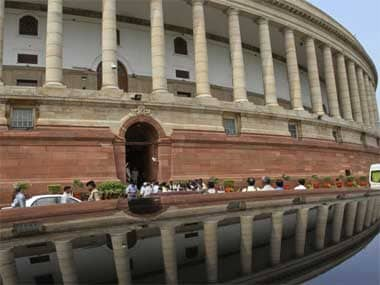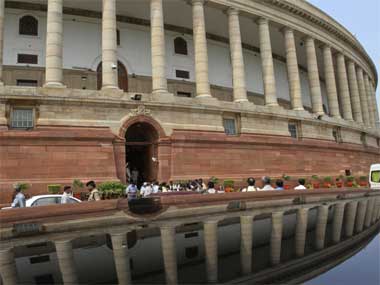“So Mr Next Prime Minister, what is your Vision for India?” This question is hurled at either contender in every television inquisition and newspaper editorial. Every time either contender ends his rally speech, commentators spring at him with the epithet “oh, but that was a load of political rhetoric. Spare us those empty slogans, but please tell us what is your Vision for India?”
I think the time has come to propagate some blasphemy. Television pundits will be shocked, powerful editors will find it immensely disagreeable, but let me say this: spare us the “vision thing”, Mr Next PM. As a country, we have over-dosed on it. Instead, heed those who do more than they think.
A good plan violently executed now is better than a perfect plan next week, said General George S Patton.
Vision without execution is hallucination, said Thomas Edison, inventor of the light bulb.
[caption id=“attachment_1323467” align=“alignleft” width=“380”]  Television pundits will be shocked, powerful editors will find it immensely disagreeable, but let me say this: spare us the “vision thing”, Mr Next PM. As a country, we have over-dosed on it. Instead, heed those who do more than they think. Reuters[/caption]
For the evangelizer of lateral thinking, Edward de Bono, the winner is the chef who takes the same ingredients as everyone else and produces the best result.
And that’s my case. I would like the next Prime Minister to make his first address to the nation as follows: “My dear countrymen, brothers & sisters - today, I take my first pledge as your Prime Minister. I vow that for the next 365 days, I shall not constitute a single new committee. I shall not requisition a single new report. Instead, right now, I shall go to our archives and dust off the dozens of wonderful reports that have been written by scores of highly competent committees. I will distribute them to each targeted department, and give them 180 days to implement their recommendations”.
Here’s a small inventory of what the Prime Minister will find under layers of dust in the archives.
The Expenditure Reforms Commission set up by the Ministry of Finance gave ten reports in 2000. It wanted many ministries and departments - steel, road transport, posts - to be either wound up, severely pruned or restructured. Time may have weathered these reports but their advice is still valid.
Then there are the reports on judicial reforms for delivery of justice quickly; and to revamp the police force.
I would also like the next Prime Minister to focus on higher education and allow foreign campuses to be set up in India. ICRIER, a Delhi-based research outfit, had recommended this in 2006 at the instance of the Commerce Ministry. It had estimated then that India spends $4 billion in sending children abroad for higher education. Ideologues on the far right and the far left have held back the legislation that would allow India to be a knowledge hub. Getting the law passed should be a priority for the next government.
Aah, the Railways! They are the locomotive of the Chinese economy. China Rail is the busiest in the world. Indian Railways are a drag. Two decades of reforms have bypassed them. Rail Bhavan is the most obdurate bureaucracy in the world. It prizes own privileges above the nation’s interest.
The new PM must revisit the Rakesh Mohan Committee Report of 2001. It is a fine document. The economist (and former deputy governor of the Reserve Bank) recommended that the Railways should hive off their non-core activities like engine and coach manufacturing and focus on the core activity of moving men and materials. For this, he wanted the Railways restructured along five business lines: freight, passenger transportation, suburban transportation, fixed infrastructure and other infrastructure. Each of these businesses would have a chief operating officer. They would be members of an executive board, and report to the chairman to be chosen from among the best available talent in India and abroad. The committee did not recommend privatization as it would not get political traction. It suggested corporatization. To promote competition, each of the zones could become a separate company. There would be a regulator to set tariffs, fix standards of service and resolve disputes.
Climate change has made the Railways a sunrise industry. Locomotion is far less greenhouse gas emitting than jet propulsion or internal combustion. It can galvanize India’s economy like Prime Minister Atal Behari Vajpayee’s Golden Quadrilateral Highway Construction Programme.
The Kakodkar Committee Report on safety which the short-lived Railways Minister Dinesh Trivedi commissioned has some fine advice too. I would also suggest that India must invest in high-speed trains. In just five years since the first line connected Beijing with the nearby port of Tianjin in 2008, China has laid 10,000 km of high-speed track. By themselves high-speed trains may not be financially profitable, but their economic spins off will be immense in terms of the development of new growth centres and decongestion of metros. The distance between Beijing and Shanghai is the same as between Delhi and Mumbai. Imagine being able to travel in six hours flat!
The burden of my song is that the time has come to reinvent the state as a machine that can get things done. Our own Iron Lady Indira Gandhi had said: “Have a bias towards action. Let’s see something happen now.”
So now we shall find out who has the gumption to walk her talk - her grandson, or his challenger? Whoever it is, sirs, spare us the “vision thing” - a lot of vision is lying orphaned, scattered under the dust of inaction - just shake it up and get cracking.


)
)
)
)
)
)
)
)
)



